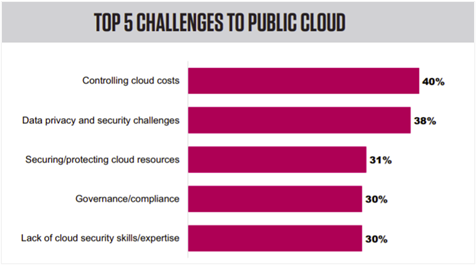Exploiting Private Cloud to Enhance Your Digital Potential
More companies are now embracing public cloud services as an alternative to on-premises computing. However, despite its popularity, numerous reports highlight the challenges of the public cloud. These issues include security, costs, and infrastructure complexity. For example, a 2021 IDG report cited that 94% of IT enterprises felt they were not optimising the full benefits of public cloud platforms, while 40% face obstacles in managing public cloud costs.
(Image source:idg.com)
Additionally, there's the risk of extensive outages that have cost companies millions of dollars. The Microsoft Office 365 outages in 2020 are still fresh in mind, as are the slew of major crashes in 2021 that rendered everything from Facebook to Google Cloud offline and demonstrated public cloud assets’ risk in no uncertain terms. In most cases, such outages are out of your control, and one can only hope the service provider will expedite a solution before the downtime eats into your revenues.
So, what other options do you have?
The answer is private cloud. Private cloud is your own space – a single-tenant solution that combines privacy, cloud infrastructure, and on-demand support.
Below, we compare public cloud and private cloud solutions and highlight how you can leverage private cloud platforms to unlock your digital potential.
Advantages of Private Cloud
Private cloud platforms offer exclusivity and more control over your cloud infrastructure. Other benefits of using private cloud services include the following.
1. Better Cost Optimisation
Users have more control over their private cloud platform, allowing improved cost optimisation while deriving more value from your cloud infrastructure. Furthermore, with quick on-demand access to public cloud resources, it’s easy for organisations to lose sight of cloud consumption resulting in higher expenditure.
Moreover, users can over-provision cloud resources, resulting in idle or unallocated services that do not deliver the intended value.
With private cloud solutions such as zsah, your resources are routinely right-sized to match workloads, ensuring you get more value without allocating more budgets.
2. Enhanced Resource Utilisation
Private cloud administrators often monitor your computing consumption to ensure resources can handle workloads without depletion or overloading. In addition, a team managing your infrastructure's resources creates more room for growth while ensuring you get more cloud mileage for your workloads.
Furthermore, various tools enhance private cloud capacity management, such as long-term resource tracking. By monitoring cloud consumption on a day-to-day basis, you can better predict and budget for additional resources.
3. Consistent Regulatory Compliance
Monitoring compliance across your cloud infrastructure requires dedicated effort to ensure your organisation complies with all regulatory and industry standards. Additionally, the public cloud provides support for legal compliance but only to a specific limit, and organisations lacking in-house legal expertise can quickly run into non-compliance and incur severe penalties.
Private cloud platforms give their users better control over configurations, procedures, and policies that need to observe regulatory requirements.
4. Reduces Complexity
A major challenge cited by 37% of businesses in a 2020 report is the complexity of managing their public cloud infrastructure. Furthermore, as more enterprises migrate their operations to multiple public cloud platforms, the complexities further complicate growth and security.
A properly deployed private cloud system reduces operational complexity by automating repetitive tasks, resource right-sizing, and breaking down silos to improve efficiency.
5. Improved Security
Since public cloud platforms have limits on customisation, you may not have the flexibility to customise their configurations to your specific security needs. Hence why private cloud platforms are great for storing, sharing, and processing sensitive data.
With a private cloud, you manage data behind your company’s firewall and continually access your server's backend to monitor network activity.
6. Consistent Availability
Public cloud outages are often out of your control. Without a speedy recovery plan, business continuity is at the mercy of the public cloud service provider and how fast they can implement a solution.
On the other hand, private cloud services provide on-demand support and can quickly resolve system issues to restore your operations in case of an outage.
Is Private Cloud the Right Solution for You?
Private cloud is ideal for enterprises keen on regulatory compliance, enhanced security, and managing costs. Also, as your business grows, you need to have a private cloud partner who'll help you scale your operations seamlessly.
Below, we've highlighted three factors you need to consider to determine your readiness to migrate to a private cloud option:
- Your digital transformation strategy: It's essential to evaluate your long-term digital transformation plans so that your private cloud provider can customise a solution that delivers the potential you desire.
- Current IT landscape: Identity what workloads, applications, and databases are scheduled for migration so your private cloud partner can prioritise and deploy the appropriate cloud resources.
- Staffing requirements: Migrating your company's operations to a private cloud requires a new set of skills to operate in a new environment. A professional private cloud provider should have a trained and certified team to address technical needs.
Ready to start your migration to a secure and private cloud platform? Get in touch with zsah to begin your journey.



